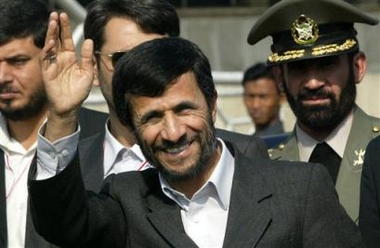Iran's president said Thursday he was ready to hold talks over his country's
nuclear program, but he warned that efforts to force Tehran to the negotiating
table with threats could backfire.
President Mahmoud Ahmadinejad also launched a scathing attack on Israel and
told more than 1,000 cheering Muslim students in the Indonesian capital that the
West was being hypocritical in pressing Iran to stop its uranium enrichment
program.

Iranian President Mahmoud Ahmadinejad waves as
he arrives to pay respect at the Heroes Cemetery, where Indonesian
soldiers are buried Thursday May 11, 2006 in Jakarta, Indonesia. Iran's
president said Thursday he was ready to negotiate with the United States
and its allies over his country's nuclear program but he also suggested
that any threats against Tehran would make the dialogue more difficult.
[AP] |
"The big powers ... have a lot of nuclear weapons in their warehouse,"
Ahmadinejad said during a visit to the world's largest Muslim majority nation
amid a deepening international standoff over Tehran's nuclear program and
suspicions it is seeking atomic weapons.
"We want to use technology for peace and the welfare of the Muslim people
around the world," he told students who gathered at Islamic University on
Jakarta's southern outskirts. "But they want to use it to invade other
countries. This is the difference between us and them."
Ahmadinejad, known for his fiery rhetoric, has become a pariah in the West.
But he received a warm welcome in Indonesia, where his willingness to
criticize the U.S.-led wars in Iraq and Afghanistan — seen by many here as
attacks on Islam — his outspoken criticism of Israel, and his refusal to stand
down to international pressure on the nuclear dispute resonates with many of its
young people.
"I think you are the man of the year," one student stood to say. "We will
always be with you. You will never walk alone," said another.
Key U.N. Security Council members agreed Tuesday to postpone a resolution
that would have delivered an ultimatum to Tehran, giving Iran another two weeks
to reevaluate its insistence on developing its uranium enrichment capabilities.
The Chinese and Russians have balked at British, French and U.S. efforts to
put the resolution under Chapter 7 of the U.N. Charter. Such a move would
declare Iran a threat to international peace and security and set the stage for
further measures if Tehran refuses to suspend its uranium enrichment operations.
Those measures could range from breaking diplomatic relations to economic
sanctions and military action.
The Iranian leader brushed off the threat, saying in an interview with Metro
TV that the West had more to lose than Tehran did if it was internationally
isolated. Sanctions would serve only to "motivate" Iran's nuclear scientists, he
said.
Asked what it would take to begin talks to resolve the standoff, Ahmadinejad
told the station Iran was "ready to engage in dialogue with anybody."
"But if someone points a weapon at your face and says you must speak, will
you do that?"
Ahmadinejad also continued his verbal attacks on Israel — last year he said
the Jewish state should be "wiped off the map" and questioned whether the
Holocaust was a myth — calling it a "a tyrannical regime that one day will be
destroyed."
He repeated earlier allegations that European countries were driven by
anti-Semitism when they decided after the Holocaust to establish a Jewish state
in the midst of Muslim countries. They wanted the Jews out of their own
backyard, he said, and by surrounding them with their enemies paved the way for
their ultimate destruction.
Israeli officials — who have described Iran's nuclear quest as the Jewish
state's greatest threat — had no immediate comment on Ahmadinejad's latest
remarks, said Israeli Foreign Ministry spokesman Mark Regev.
Indonesia has cordial relations with Iran, supporting its right to pursue
nuclear technology for peaceful means. Like Tehran — which recently announced
plans to invest $600 million in the Southeast Asian nation's oil and gas sector,
a much-needed cash infusion — Jakarta also refuses to recognize Israel.
But President Susilo Bambang Yudhoyono also enjoys good ties with the United
States, which considers him a close ally in the war on terror. He offered this
week to mediate the nuclear dispute.
The students who crammed into the auditorium at the Islamic University —
where U.S. envoy Karen Hughes received a grilling last year over U.S. foreign
policy in the Middle East — were enthusiastic supporters of the Ahmadinejad,
clapping and cheering throughout his 90-minute speech.
He told the crowd every country should have the right to new technology to
meet energy needs.
"If nuclear technology is such a bad thing, why do you (Western countries)
have it?" Ahmadinejad said, drawing more applause.
He got the same response earlier in the day when he addressed a crowd of
about 300 at the University of Indonesia, where students held signs saying "Iran
in our Hearts," and "Nuclear for Peace."
"I loved him, he was very charismatic," said a first-year economics student
who identified herself as Deslina. "If it comes to that, they should go to war.
If I could, I would fight the United States."